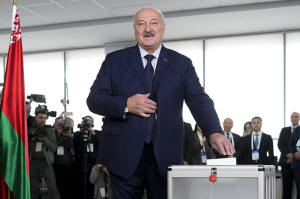Belarus strongman wins a 7th term in an election the opposition calls a
farce
 Send a link to a friend
Send a link to a friend
 [January 27, 2025]
By YURAS KARMANAU [January 27, 2025]
By YURAS KARMANAU
The smiling face of President Alexander Lukashenko gazed out from
campaign posters across Belarus on Sunday as the country held an
orchestrated election virtually guaranteed to give the 70-year-old
autocrat yet another term on top of his three decades in power.
“Needed!” the posters proclaim beneath a photo of Lukashenko, his hands
clasped together. The phrase is what groups of voters responded in
campaign videos after supposedly being asked if they wanted him to serve
again.
And according to a nighttime statement by the Central Election
Commission, the strongman leader won by a landslide, garnering nearly
87% percent of the vote.
But his opponents, many of whom are imprisoned or exiled abroad by his
unrelenting crackdown on dissent and free speech, would disagree. They
call the election a sham — much like the last one in 2020 that triggered
months of protests that were unprecedented in the history of the country
of 9 million people.
The crackdown saw more than 65,000 arrests, with thousands beaten,
bringing condemnation and sanctions from the West.
His iron-fisted rule since 1994 — Lukashenko took office two years after
the demise of the Soviet Union — earned him the nickname of “Europe’s
Last Dictator,” relying on subsidies and political support from close
ally Russia.
He let Moscow use his territory to invade Ukraine in 2022, and even
hosts some of Russia's tactical nuclear weapons, but he still campaigned
with the slogan “Peace and security,” arguing he has saved Belarus from
being drawn into war.
“It’s better to have a dictatorship like in Belarus than a democracy
like Ukraine,” Lukashenko said in his characteristic bluntness.

Fearing a repeat of election unrest
His reliance on support from Russian President Vladimir Putin — himself
in office for a quarter-century — helped him survive the 2020 protests.
Observers believe Lukashenko feared a repeat of those mass
demonstrations amid economic troubles and the fighting in Ukraine, and
so scheduled the vote in January, when few would want to fill the
streets again, rather than in August. He faces only token opposition.
According to official results, announced in the early hours of Monday,
Lukashenko won 86.82% of the vote - compared to his nearest rival's
3.21%. According to the Central Election Commission, 3.60% of voters
spoilt their ballots.
In 2020, the electoral body claimed Lukashenko had taken 80.10% of the
vote.
“The trauma of the 2020 protests was so deep that Lukashenko this time
decided not to take risks and opted for the most reliable option when
balloting looks more like a special operation to retain power than an
election,” Belarusian political analyst Valery Karbalevich said.
Lukashenko repeatedly declared that he wasn’t clinging to power and
would “quietly and calmly hand it over to the new generation.”
His 20-year-old son, Nikolai, traveled the country, giving interviews,
signing autographs and playing piano at campaign events. His father
hasn’t mentioned his own health, even though he was seen having
difficulty walking and occasionally spoke in a hoarse voice.
“The successor issue only becomes relevant when a leader prepares to
step down. But Lukashenko isn’t going to leave,” Karbalevich said.
Top political opponents imprisoned or exiled
Leading opponents have fled abroad or were thrown in prison. The country
holds nearly 1,300 political prisoners, including Nobel Peace Prize
laureate Ales Bialiatski, founder of the Viasna Human Rights Center.
Since July, Lukashenko has pardoned more than 250 people. At the same
time, authorities have sought to uproot dissent by arresting hundreds
more in raids targeting relatives and friends of political prisoners.
Authorities detained 188 people last month alone, Viasna said. Activists
and those who donated money to opposition groups have been summoned by
police and forced to sign papers saying they were warned against
participating in unsanctioned demonstrations, rights advocates said.
Lukashenko's four challengers on the ballot are all loyal to him.
“I’m entering the race not against, but together with Lukashenko, and
I’m ready to serve as his vanguard,” said Communist Party candidate
Sergei Syrankov, who came in second place. He favors criminalizing LGBTQ+
activities and rebuilding monuments to Soviet leader Josef Stalin.
Candidate Alexander Khizhnyak, head of the Republican Party of Labor and
Justice, led a voting precinct in Minsk in 2020 and vowed to prevent a
“repeat of disturbances.”
Oleg Gaidukevich, head of the Liberal Democratic Party, supported
Lukashenko in 2020 and urged fellow candidates to “make Lukashenko’s
enemies nauseous.”
[to top of second column]
|

Belarusian President Alexander Lukashenko casts his ballot at a
polling site during voting in presidential elections in Minsk,
Belarus, Sunday, Jan. 26, 2025. (AP Photo/Pavel Bednyakov)

The fourth challenger, Hanna Kanapatskaya, managed 1.7% of the vote
in 2020 and says she's the “only democratic alternative to
Lukashenko,” promising to lobby for freeing political prisoners but
warning supporters against “excessive initiative.”
Opposition leader calls election ‘a senseless farce’
Opposition leader-in-exile Sviatlana Tsikhanouskaya, who fled
Belarus under government pressure after challenging the president in
2020, told The Associated Press that Sunday's election was “a
senseless farce, a Lukashenko ritual.”
Voters should cross off everyone on the ballot, she said, and world
leaders shouldn't recognize the result from a country “where all
independent media and opposition parties have been destroyed and
prisons are filled by political prisoners."
“The repressions have become even more brutal as this vote without
choice has approached, but Lukashenko acts as though hundreds of
thousands of people are still standing outside his palace,” she
said.
The European Union rejected the election in Belarus on Sunday as
illegitimate and threatened new sanctions.
“Today’s sham election in Belarus has been neither free, nor fair,”
EU foreign policy chief Kaja Kallas and EU enlargement commissioner
Marta Kos said in a joint statement.
Shortly after voting in Minsk on Sunday, accompanied by his white
Pomeranian dog, Lukashenko told journalists that he did not seek
recognition or approval from the EU.
“The main thing for me is that Belarusians recognize these elections
and that they end peacefully, as they began,” he said.
Speaking at an hourslong news conference, Lukashenko said that he
didn't rule out running for the top job again in 2030.
Media freedom watchdog Reporters Without Borders filed a complaint
against Lukashenko with the International Criminal Court over his
crackdown on free speech that saw 397 journalists arrested since
2020. It said that 43 are in prison.
Fears of vote-rigging
According to the Central Election Commission, there are 6.8 million
eligible voters. However, about 500,000 people have left Belarus and
aren't able to vote.
After polls closed at 8 p.m. local time (1700 GMT), the commission
said that turnout stood at a record 85.70%, but a dearth of
independent monitoring made that figure near-impossible to verify.
At home, early voting that began Tuesday has created fertile ground
for irregularities with ballot boxes unguarded until election day,
the opposition said. A record 41.81% of voters cast ballots in five
days of early voting. Meanwhile, Viasna activists reported internet
issues across the country, and alleged Lukashenko's government was
blocking access to VPN services commonly used to evade censorship.

Polling stations have removed the curtains covering ballot boxes,
and voters are forbidden from photographing their ballots — a
response to the opposition's call in 2020 for voters to take
pictures to make it more difficult for authorities to rig the vote.
Police conducted large-scale drills before the election. An Interior
Ministry video showed helmeted riot police beating their shields
with truncheons as a way to prepare for protest dispersals. Another
featured an officer arresting a man posing as a voter, twisting his
arm next to a ballot box.
Increasing dependence on Russia
Lukashenko’s support for the war in Ukraine has led to the rupture
of Belarus’ ties with the U.S. and the EU, ending his gamesmanship
of using the West to try to win more subsidies from the Kremlin.
He spoke of Russian nuclear weapons deployed in Belarus as a
guarantee of peace, and said he would pick Moscow as his first
official visit if he's reelected.
“Until 2020, Lukashenko could maneuver and play Russia against the
West, but now when Belarus’ status is close to that of Russia’s
satellite, this North Korea-style election ties the Belarusian
leader to the Kremlin even stronger, shortening the leash,” said
Artyom Shraybman, a Belarus expert with the Carnegie Russia and
Eurasia Center.
After the election, Lukashenko could try to ease his total
dependence on Russia by again seeking to reach out to the West, he
predicted.
All contents © copyright 2025 Associated Press. All rights reserved |